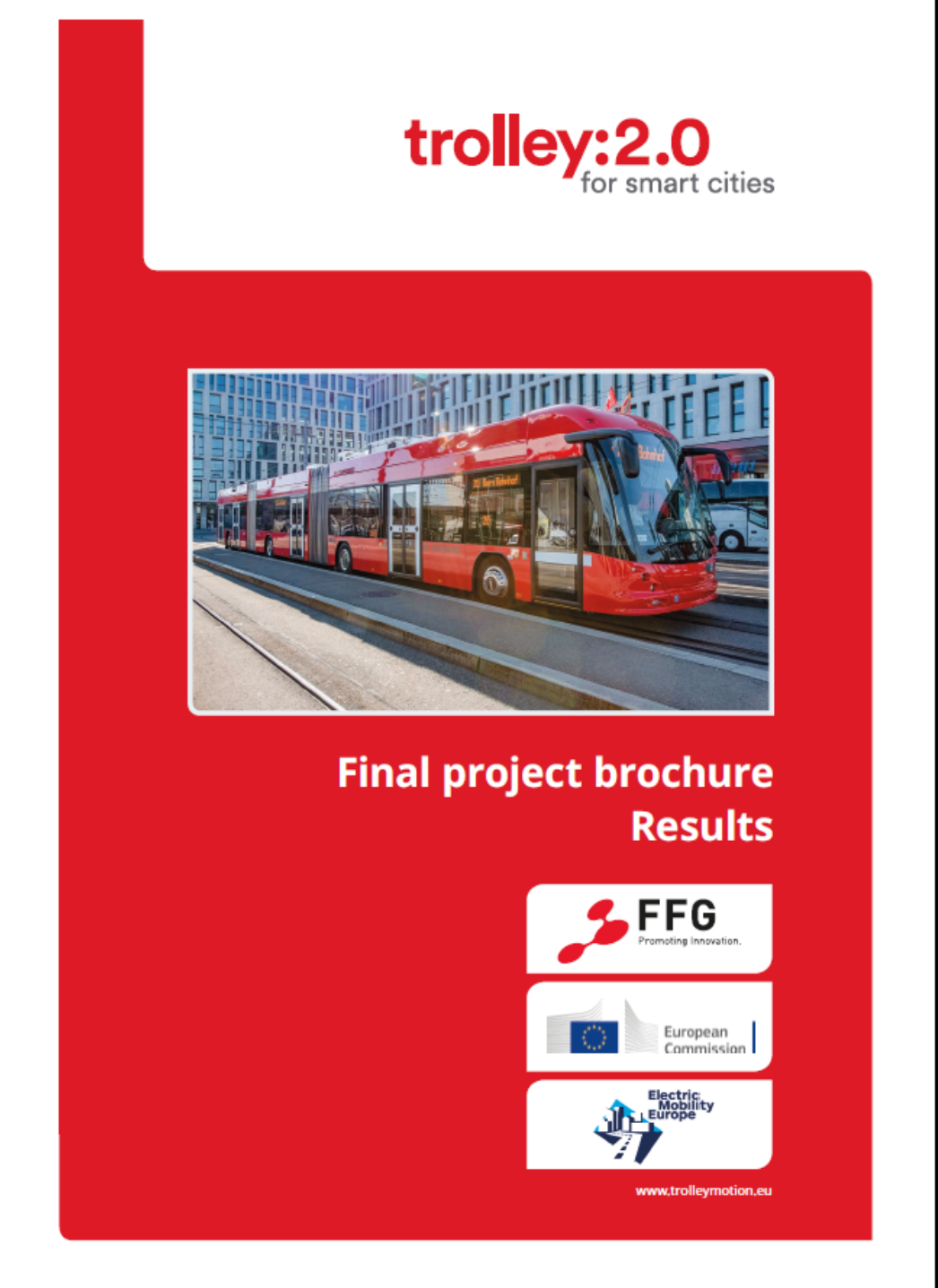

trolley:2.0 in Brief
Duration: 04/2018 till 09/2020
Budget: Euro 3 Millionen
Partner Countries: AT, DE, HU, NL, PL
Project partners
- trolley:motion, international action group to promote modern Trolleybus Systems, Austria
- Szeged Transport Company (SZKT), Szegedi Közlekedési Kft., Szeged, Hungary
- University of Szeged (USZ), Szegedi Tudományegyetem, Szeged, Hungary
- evopro Group, Budapest, Hungary
- Barnim Bus GmbH, Eberswalde, Germany
- Technical University of Dresden, Dresden, Germany
- University of Gdansk, Gdansk, Poland
- Technical University of Delft, Delft University of Technology (TU Delft), Delft, Netherlands
- Power Research Electronics (PRE), Breda, Netherlands

New developments of modern trolleybus systems for smart cities
Introduction
The trolley:2.0 project aimed to combine the advantages of modern trolleybus systems and battery-supported electric buses. Hybrid trolleybuses with in-motion charging (IMC) enable emission-free transport in urban areas and enhance flexibility by allowing wireless operation on selected routes. The project involved four European cities with existing trolleybus systems: Arnhem (NL), Eberswalde (DE), Gdynia (PL), and Szeged (HU). It demonstrated innovations such as automated wiring systems, smart energy grids, the integration of renewable energy sources, and new charging concepts
Objectives
- Technology Demonstration: Test hybrid trolleybuses with IMC in real-world scenarios, including battery performance and charging methods.
- Smart Energy Grids: Develop intelligent grids for charging stations and integrate renewable energies like solar and wind power.
- Vehicle Technology Innovations: Introduce lightweight, battery-based trolleybuses with automated wiring systems.
- Operation and Cost Optimization: Evaluate economic models to reduce infrastructure costs through hybrid systems.
- Integration and Transferability: Develop strategies to replicate project results in other cities
Results
- Technological Advancements:
- In Arnhem, trolleybuses achieved a minimum range of 10 km without overhead lines.
- Eberswalde transitioned to a battery-electric line, significantly reducing CO₂ emissions.
- Gdynia developed new routes and energy storage concepts.
- Szeged introduced lighter midi-trolleybuses capable of running up to 20 km without overhead lines.
- Infrastructure and Operational Efficiency:
- Installation of a 350 kW DC charger in Arnhem.
- Use of second-life batteries for stationary energy storage.
- Development of tools for cost estimation and decision-making in trolleybus network expansion.
- Renewable Energy Integration:
- Combined solar and wind power with trolley networks.
- Testing of storage solutions to enhance grid stability.
Recommendations
- Technology Development: Conduct further research on battery capacity, electronic power control, and energy storage systems.
- Legal Framework and Planning: Harmonize regulations across Europe and develop strategies to engage the public in planning new systems.
- Urban Infrastructure Design: Create street and BRT designs that incorporate trolleybuses as the backbone of zero-emission public transport.
- Cost Reduction: Promote retrofit projects and optimized use of existing networks to reduce investment and operational costs.
- Replication and Scaling: Provide guidelines for transferring the project results to other cities and regions
User Forum/Associated Cities/Twining Cities
- Athens Public Trolleybus Operator OSY, Odikes Sygkoinonies S.A., Aghios Ioannis Rentis, Greece
- Berlin Public Transport Operator (BVG), Berliner Verkehrsbetriebe, Berlin, Germany
- Bologna Public Transport Operator (TPER), Trasporto Passeggeri Emilia-Romagna, Bologna, Italy
- Budapest Public Transport Operator (BKV), Budapester Verkehrs-Aktiengesellschaft, Budapest, Hungary
- City of Maribor, Maribor, Slovenia
- Esslingen Public Transport Operator (SVE), Städtischer Verkehrsbetrieb Esslingen, Esslingen, Germany
- Hordaland County Council, Bergen, Norway
- Klagenfurt Public Transport Operator (STW), Stadtwerke Klagenfurt, Klagenfurt, Austria
- Lublin Public Transport Operator (MPK), Lublin, Poland
- Marburg Public Transport Operator (SWMR), Stadtwerke Marburg, Marburg, Germany
- Pilsen Public Transport Operator (PMDP), Plzeňské městské dopravní podniky, a.s., Pilsen, Czech Republic
- Salzburg Public Transport Operator (SAG), Salzburg AG, Salzburg, Austria
- Solingen Public Transport Operator, Stadtwerke Solingen GmbH – Verkehrsbetrieb, Solingen, Germany
- Zurich Public Transport Operator (VBZ), Verkehrsbetriebe Zürich, Zurich, Switzerland
